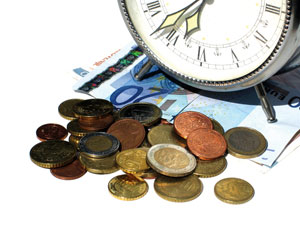 |
The creation of the euro just over a decade ago was a courageous and unique experiment. Today, the outcome � whether the euro will survive, and whether the Europeans are right to keep it � is very much in doubt.
The euro shares important features with versions of the old gold standard, under which countries fixed their exchange rates relative to each other by setting the price at which domestic currency could be redeemed in gold. But there are three differences between the euro and the gold standard � none of which is particularly reassuring at this moment.
First, the gold standard's central premise was that there was a finite quantity of gold in the world. By contrast, the European Central Bank can create more euros if desired. Governments and investors know this, and the result has been much higher debt-to-GDP ratios, with the Eurozone recording a debt-to-GDP ratio as high as 90 per cent at present. If the ECB threatens to cut off support, the whole house of cards can come tumbling down.
Second, financial markets have become huge relative to anything seen under the gold standard. With the backing of their governments, European banks have become relative to some national economies. But these banks have been operating on a great deal of debt and very little shareholder capital � the essential buffer against potential losses. Any shock to sovereign debt or further downturn in local economies will be transmitted through an overleveraged and undercapitalised banking system to other European countries and beyond.
Finally, for all the talk today of the discipline that the gold standard supposedly provided, countries that adhered to it regularly suspended convertibility � meaning that the domestic currency could no longer be converted freely into gold. But today's Europeans have no domestic currency � just the euro. If any country � for example, Greece � left the euro, all contracts in that country would have to be rewritten. The disruption, particularly to credit, would be profound.
The news focus today is on how hard it is for the Eurozone periphery to adjust and return to growth, owing to the combination of high public debt and actual or perceived austerity measures. But there is a flip side to the problem: capital is flowing to Germany as the regional safe haven, making credit more readily available there. The dynamics of adjustment within the Eurozone exacerbate the underlying imbalances � Germany is becoming more competitive while the periphery remains uncompetitive.
The recent Greek elections have brought more radical parties to the fore. Alexis Tsipras, the head of the Coalition of the Radical Left has a valid point: 'internal devaluation' � cutting wages and prices � is failing as a strategy. His alternative appears to be to abandon the euro. If Greece can't do better than this, he argues, then it should leave.
But this is not about Greece any longer. Italy, Spain, Portugal, and even Ireland face the same issues, but are at an earlier stage in the backlash. Unemployment is rising, their economies are not becoming more competitive, and the interest rates on their debt continue to rise. These countries may eventually decide to leave. And, even if they don't make that choice, fear of such exits can easily become self-fulfilling.
The Euro system was designed to deliver prosperity and stability for all. It has clearly failed for some countries, and it may fail for many. Severe mismanagement by European politicians has caused damage that will last for decades.
Perhaps a stronger fiscal union, a central ministry of finance, and debt sharing would reduce the difficulties and imbalances enough to allow the euro to survive. Perhaps adjustment will start to work just in time.
There is a lot of shouting in the jury room. Expect a verdict soon.
Peter Boone and Simon Johnson
Peter Boone is the chairman of Effective Intervention at the London School of Economics. Simon Johnson is a former chief economist at IMF. www.projectsyndicate.com
Read also:
Not all doom and gloom, PAAVAN MATHEMA
Politics aside, Nepal's macroeconomic indicators are doing well thanks to a strong dollar


